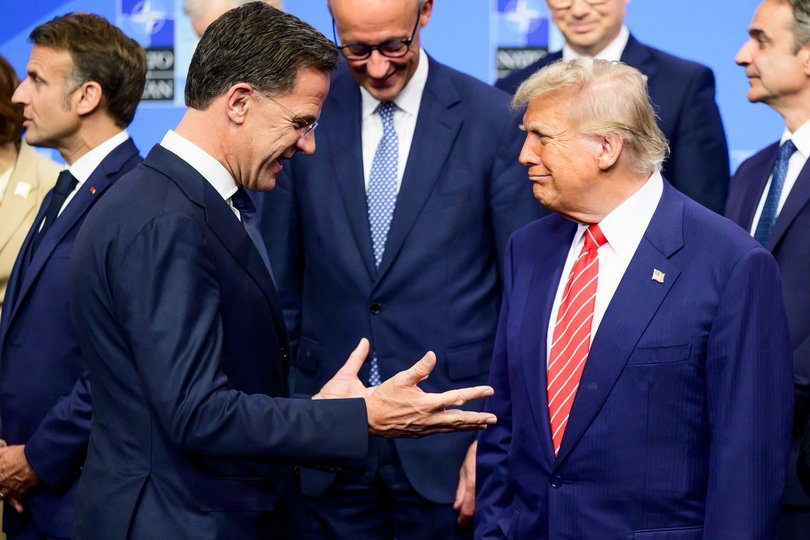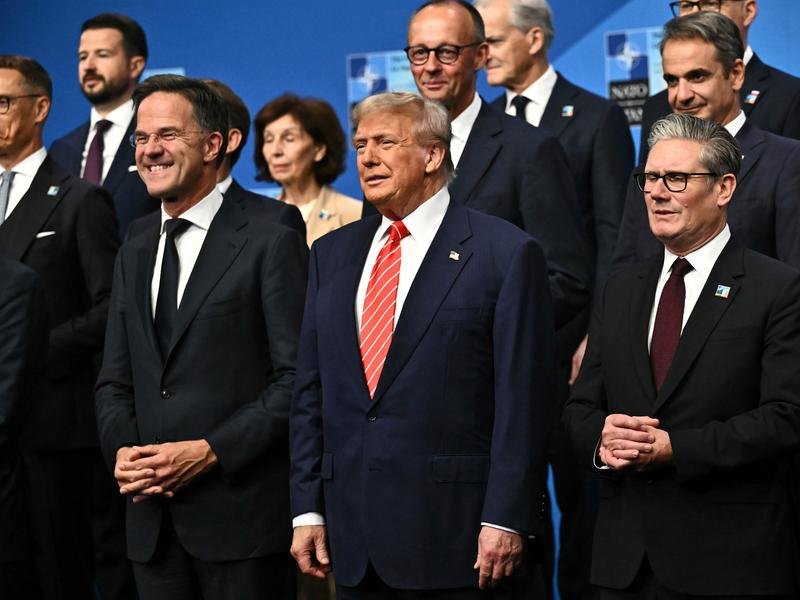LATIKA M BOURKE: ‘Monumental victory’ as US President Donald Trump backs NATO
LATIKA M BOURKE: US President Donald Trump says he no longer believes NATO is a rip-off now that European leaders have pledged major increases to their defence spending.
US President Donald Trump has thrown his support behind NATO, saying he no longer believes it is a rip-off now that European leaders have pledged major increases to their defence spending.
And the US President stated that the collective defence alliance cannot work without the United States, although he left the door open to it being capable without America “in the future.”
But he blasted Spain for securing an exemption to the commitment, warning he would make them pay “twice” through trade, although it is unclear how this would work in practice, as trade is negotiated by the European Union for all member states and not by individual capitals.
Sign up to The Nightly's newsletters.
Get the first look at the digital newspaper, curated daily stories and breaking headlines delivered to your inbox.
By continuing you agree to our Terms and Privacy Policy.Spain’s socialist Prime Minister Pedro Sanchez insisted he would meet his capability obligations while protecting his welfare state, spending a mere 2 per cent of his budget on defence.
Nevertheless, the declaration came as a huge relief to European leaders and followed a charm offensive by the Alliance’s new boss Mark Rutte, who doubled down on the gushing tone of his messages praising Mr Trump for getting NATO to spend up, which the US President published online.
Mr Rutte referred to Mr Trump as “Daddy” during their meeting ahead of the summit, a joking reference to the President’s frustrated ‘f-bomb’ used when discussing Iran and Israel a day earlier.
Mr Trump had been likening Iran and Israel to children, prompting Mr Rutte’s jest. He defended his flattery of Mr Trump as “a question of taste” and said the President was a “good friend” who “deserved praise”.
“Would you ever think that this would be the result of this summit if he would not have been re-elected president?” Mr Rutte said.
“Do you really think that the seven or eight countries who said yes, somewhere in the 2030s we might meet the 2 per cent?
“We’ve now all decided the last four or five months to get to 2 per cent.
“So doesn’t he deserves some praise?”
In a brief declaration of just 424 words, NATO members agreed to spend 3.5 per cent of GDP on core defences and a further 1.5 per cent on related infrastructure by 2035, with an audit within four years to check they are keeping their promises and yearly reviews.
The US President hailed the NATO gathering in The Hague, which Prime Minister Anthony Albanese boycotted for a second time in a row, despite being granted a special invitation as an Indo-Pacific leader, as a “monumental victory” and a big win for “Western civilisation.”
“Tremendous things have been accomplished,” he said.

He said he had attended the summit out of obligation but left a changed man.
“On Article 5, when I came here, I came here because it was something I’m supposed to be doing,” he told several hundred reporters, including The Nightly, after the summit ended.
“And I left here differently, I left here saying that these people really love their countries.
“I watched the Heads of these countries get up and the love and the passion they showed for their country was unbelievable.
“Almost every one of them said ‘Thank God for the United States.’
“It’s not a rip-off, and we’re here to help them protect their country.”
He said NATO couldn’t work without the US but suggested Europe might one day be able to stand on its own two feet.
“It will in the future because now they are paying much more money.”
UK Prime Minister Sir Keir Starmer said NATO was bigger and stronger.
At the heart of NATO, a defensive alliance, is its collective defence clause, Article 5, which is aimed at deterring aggressors, namely Russia and states that an attack on one is considered an attack on all.
NATO members reaffirmed their “ironclad commitment to collective defence,” which was a crucial outcome as Mr Trump and his MAGA supporters have at times questioned whether the US should continue to support Europe, primarily by extending its nuclear umbrella to the continent.
German intelligence has warned of the prospect of a Russian attack on NATO territory within five years.
NATO allies also agreed that Russia poses a threat to Euro-Atlantic security and not just European security, which is also significant and a key form of words the Europeans were wanting the Americans to agree to.
Mr Trump agreed that it was “possible” that Russia had territorial ambitions beyond Ukraine.
He met Ukraine’s President Volodymyr Zelensky and said their meeting was “very nice.”
Mr Zelensky said on X that the meeting was very good.
“We discussed the protection of our people with the President — first and foremost, the purchase of American air defense systems to shield our cities, our people, churches, and infrastructure,” the President said.
“Ukraine is ready to buy this equipment and support American weapons manufacturers. Europe defencecan help.
“We also discussed the potential for co-production of drones.
“We can strengthen each other.”

In a warm exchange with a Ukrainian journalist, whose husband was fighting on the frontline, Mr Trump promised to look at making more Patriot missiles available to Ukraine.
He was flanked by his Secretary of State Marco Rubio and Defence Secretary Pete Hegseth who has been pressuring Australia to also raise its defence spending to NATO’s 3.5 per cent level.
Prime Minister Anthony Albanese and Treasurer Jim Chalmers have both rebuffed the request.
But speaking after the summit, Defence Minister Richard Marles said the door remained open.
“We’ve gone through our own process of assessing our strategic landscape, assessing the threats that exist there, and the kind of defence force we need to build in order to meet those threats, to meet the strategic moment, and then to resource that,” he said.
“And what that has seen is the biggest peacetime increase in Australian Defence spending that we have seen in our history.
“Now that is a story which is understood here and we’ll continue to assess what our needs are going forward.
“And as our Prime Minister has said, we will resource that.”
Mr Marles did not meet his US counterpart at the meeting and a scheduled meeting with President Trump and the four leaders of the Indo-Pacific 4, was removed from the schedule.
Japan and South Korea joined Australia in sending more junior ministers.
New Zealand’s Prime Minister Christopher Luxon, was granted bilateral meetings with Germany’s new Chancellor, Friedrich Merz and the leaders of Canada, Romania and Norway.
Mr Marles had a chance meeting with Canada’s Prime Minister Mark Carney, but a formal meeting with his Ukrainian counterpart Rustem Umerov.
He said Australia would send a surveillance jet to monitor humanitarian passage of aid to Ukraine. This would require the support of 100 Australian military personnel in Poland for the three-month rotation.

